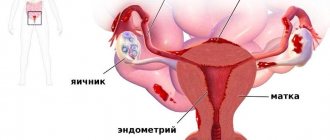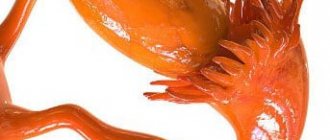Why do pads cause allergies?
Thin and delicate skin in the groin area is most susceptible to negative factors, especially after hair removal. Most often, allergies to pads occur for the following reasons:
- rare change;
- exposure to flavorings;
- skin contact with dyes.
In addition, conditionally pathogenic microorganisms are constantly present on the mucous membrane of the genital organs, which, if they multiply excessively, cause inflammation. Even the most modern and high-quality products create favorable conditions for the life of bacteria and microscopic fungi, because their outer layer is made of dense materials that do not allow moisture and air to pass through.
Some women may develop an allergic reaction to products that do not have fragrances or dyes. This is due to the fact that “breathable” pads create a greenhouse effect in the perineum. In such a warm and humid environment, the number of pathogenic microbes quickly increases, which leads to disruption of the homeostasis of the genital mucosa. As a result, inflamed skin and epithelium become sensitive to any potential allergens.
Are allergies likely to occur in pregnant women and those who have recently given birth?
During the period of bearing a child, a restructuring of the endocrine and immune systems occurs. A woman becomes especially sensitive to external stimuli. At this time, symptoms of intolerance may appear even when using hypoallergenic panty liners.
After childbirth, the female body becomes more sensitive
After childbirth, abrasions and ruptures of the perineum are common. Wounded skin reacts painfully to any friction and irritation. Even familiar remedies can trigger an allergic reaction.
How does an allergic reaction occur?
When an allergy to pads develops, the most common symptoms observed are:
- itching and burning in the groin area;
- swelling and redness of the external genitalia;
- rashes on the skin of the perineum.
Severe itching of the genitals causes anxiety and causes increased irritability and insomnia. The development of dysbacteriosis against the background of allergies is indicated by the appearance of copious, unpleasant-smelling discharge from the genital tract. They may have a cheesy consistency and a yellowish color. If treatment is not started on time, there is a high risk of developing complications in the future: colpitis, urethritis and cystitis.
Manifestations
Intolerance to pads is never accompanied by generalized reactions; manifestations are exclusively skin. At the same time, the woman is worried about a number of unpleasant sensations:
- the vagina begins to itch unbearably;
- a large amount of white discharge appears;
- mucous membranes swell and turn red;
- the vagina becomes dry, which makes sexual intercourse unpleasant and painful;
- the inguinal folds and vulva become covered with a rash.
Symptoms of an allergy to panty liners make a woman nervous and irritated, as they cause significant discomfort.
Local fight against allergies in the intimate area
When symptoms of this disease appear, the first thing to do is remove the sanitary pad and wash the perineum with cool running water without using soap or shower gel. After washing, gently pat your skin dry with a towel rather than rubbing it. At the stage of eliminating the allergic reaction, stop wearing synthetic underwear. To eliminate itching, burning and inflammation, it is recommended to treat the skin several times a day with a 5% alcohol tincture of any herbs or a weak solution of potassium permanganate.
Treatment of allergies to pads is also carried out using various ointments and creams,
- having an anti-inflammatory effect (“Elidel”, “Bepanten”, “Lanolin”);
- containing antihistamines (“Fenistil”, “Gistan N”);
- having an antiseptic effect (“Levomekol”, “Ficidin”).
When an allergy to pads is quite severe, you cannot do without the use of ointments with corticosteroids. These products include Advantan, Lorinden S, and Elokom. It is impossible to treat allergy symptoms with such drugs for a long time, since with prolonged use, hormonal ointment can cause side effects. Dysbacteriosis, which appears against the background of allergies, should be treated with drugs that restore the normal microflora of the vagina (Bifidumbacterin, Lactobacterin). During the treatment period, it is advisable to abstain from sexual intercourse.
Prevention
What to do if you are allergic to pads? Not using them is the simplest answer. If this is not possible, then you need to follow the following tips:
- find out which pads you are allergic to : the same brand, with the same smell, a natural coating or a soft top layer, and do not buy allergenic hygiene products;
- It is necessary to change a panty liner at least every 4 hours (however, the more often, the better), a “menstrual” pad - every 4-6 hours. And only urological pads can “last” up to 8-9 hours in a row;
- carefully monitor intimate hygiene:
- do not use regular soap;
- wash twice a day (more often only during menstruation);
- wash from front to back.
Do you even need to wear diaries every day?
It would seem that the tautology is not justified - the purpose of panty liners is to “put them on” every morning. However, in reality this is not the case. Gynecologists recommend using panty liners in the following cases:
- during ovulation;
- first and last day of menstruation;
- in a situation where there is no opportunity to wash and change clothes (for example, on the road);
- disposable (!), if you need to wear “very synthetic” underwear.
How to replace pads if you are allergic to them? Can be used during menstruation:
- sanitary tampons;
- menstrual caps;
- homemade pads made of cotton wool, gauze and thick fabric.
In everyday life, the best advice would be to wear underwear made from natural materials and change it as often as possible.
Systemic treatment
Therapy with tablet forms of antihistamines or corticosteroids is not carried out for such allergies, because in almost all cases local treatment is sufficient. However, if the swelling and itching of the external genitalia are too severe, the doctor may prescribe a short course of the latest generation of antihistamines:
- "Altiva";
- "Zodak";
- "Erius".
The speedy elimination of allergies is facilitated by taking general strengthening medications, which increase the body's resistance to the adverse effects of allergens. Therefore, the gynecologist usually prescribes a course of vitamin therapy, as well as taking immunostimulating agents: tinctures of echinacea or eleutherococcus.
The fight against an allergic reaction will be more effective if a woman follows a diet. It is advisable to at least temporarily limit the consumption of simple carbohydrates, fatty, fried and spicy foods, citrus fruits, and foods high in preservatives and dyes. Remember that people who experience overwork and regular stress, live in unfavorable environmental conditions and move little are more susceptible to the development of allergic diseases.
What to do?
If there are symptoms of hypersensitivity, appropriate therapy should be carried out.
First of all, it is recommended to get rid of the irritant and prescribe medications to eliminate signs of allergies. Immediately after your health worsens, you should stop using pads and take a shower. You should not use regular soap while bathing. Only special intimate hygiene products are suitable, as they have a gentle effect on the microflora.
The best treatment option is the use of antihistamine ointments. Itching and redness are relieved with Elidel, Gistan, Fenistil. The products are suitable for treating only the external genitalia.
With the help of Panthenol or Bepanten they get rid of dry skin. Vagilak gel can be used to treat not only the external part of the genital organs. It is applied to an applicator, which is inserted into the vagina. The drug is prescribed for dry mucous membranes.
If irritation in the intimate area from pads is not relieved by local medications and there are other symptoms that cause a lot of discomfort, antihistamines are prescribed. Allergies are usually treated with Suprastin, Tavegil, Zyrtec and others.
How long the allergy lasts depends on the severity of the reaction. Usually the exacerbation goes away within a day. But it takes more time for the mucous membranes to fully recover. Typically, complete relief occurs 3-4 days after quitting the irritant.
Sometimes folk remedies are used to relieve symptoms. For example, chamomile is brewed and the decoction is used for washing. But medicinal plants are best used in combination with traditional medicine methods.
Herbal medicine against allergies
Some women experience an allergic reaction spreading to the vaginal mucosa. In this case, doctors sometimes recommend douching with antiseptic and anti-inflammatory solutions. It is undesirable to do such procedures without prior consultation with a gynecologist, since if done incorrectly, douching can only worsen the situation.
To prepare herbal infusion, take 1 - 2 tbsp. dried chamomile flowers or nettle leaves, pour 500 ml of boiling water and leave for 2 - 3 hours. Strain the finished infusion and add another 500 ml of boiled water. This solution can be used as an auxiliary treatment; it is suitable for douching, sitz baths, washing and compresses.
How to prevent allergies to pads
Since an allergy to pads sometimes leads to undesirable consequences, it is better to prevent it than to treat it. Following simple recommendations will help avoid the development of an allergic reaction.
- Do not wear panty liners all the time; the real need for their use arises a few days before the start of menstruation and within 2 - 3 days after its end.
- During periods without menstruation, refrain from using daily pills at night.
- Buy simple products without flavors or dyes.
- Allergic reactions are least likely to be caused by natural absorbent substances, such as wood cellulose, so carefully study the composition of the filler before purchasing.
- Change sanitary pads every 2 to 4 hours to prevent them from becoming a source of pathogens.
- Be sure to wash your hands before changing the pad.
- Select sanitary pads according to the amount of discharge.
- Use products with a good adhesive base, which will prevent the gasket from creasing and rubbing the skin.
- Choose comfortable underwear made from natural fabrics.
Gynecologists believe that healthy women do not need to constantly use sanitary pads; regular changes of underwear, as well as washing in the morning and evening, are enough for them. If you have to use scented panty liners because of heavy discharge with an unpleasant odor, you should consult a specialist, as this may be a sign of a chronic infection.
When comprehensive treatment for an allergic reaction does not bring positive results, consult your doctor again for a vaginal smear test. Worsening of the condition may be caused by pathogens and not by wearing sanitary pads. Finally, remember that it’s not just pads that cause allergies; other intimate hygiene products, lubricants, spermicides, condoms, and even your partner’s seminal fluid can be the cause.
Diagnostics
Many women carry it out on their own, stopping the use of pads and feeling an improvement, they are convinced that the assumption of an allergic reaction is correct. But this method is only suitable for those who were able to immediately find an alternative option. If this does not happen and the search for a safe hygiene product is delayed, there is a suspicion of a concomitant infection, you need to see a doctor.
History taking
Diagnostics in any field of medicine begins with it, and allergic pathologies are no exception. To get an idea of the possible reasons for the deterioration of the patient’s condition, the specialist needs to clarify a number of important information. Be prepared to answer questions such as:
- When did the complaints start?
- What do you associate them with?
- What kind of pads have you been using and for how long?
- Do you use contraception (including spermicides, latex condoms)?
- Have you recently undergone treatment for a fungal or bacterial infection of the genital organs?
When collecting an anamnesis, you should “cover” the maximum number of suspected allergens, then there will be a chance to reduce the time and increase the effectiveness of the diagnostic search.










